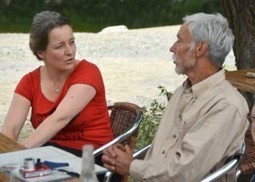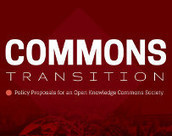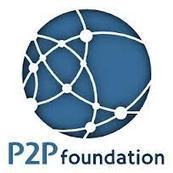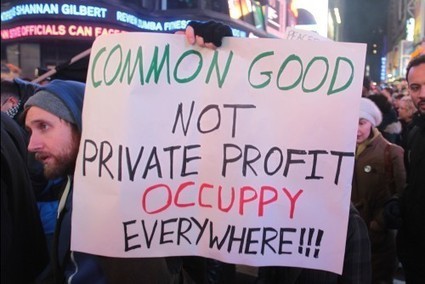 Your new post is loading...
An excellent documentary, with english subtitles, coming from Sweden: “This is a solid, thought provoking documentary covering a relevant economic topic in-depth. The question of capitalism’s grip on the modern world is highly relevant today and the film questions if we should be pushing for a democratic cooperative way of doing business, showing case studies... Continue reading →
We need an energetic public debate over how to construct a new constitutional settlement which nurtures today’s collective forms of digital citizenship.
Can the commons serve as an alternative to the corporate or state domination of big data, the lifeblood of this dawning digital world? Can it serve as the foundation for collective empowerment? Can it provide a means of criticizing the IT corporations’ perception of themselves? From the Berliner Gazette, presenting the project, ‘Big Data in …
How the professional psychologies and big pharma enclose and exploit key elements of the psycommons
“This year marks the 800th anniversary of the signing of the Magna Carta, and this weeks show marks that occasion with a discussion on the rights of the commons with author Peter Linebaugh. We also visit a community center in Caracas, and hear from youth voices about life and revolution in Venezuela.”
“A basic income is in a way a minimum claim to resources, with each person using this to claim the resources most important to them. The fact a basic income is given regardless of work, makes it that much more clear it exists as such a claim on resources based on the shared right to such resources.
Italy lags behind most of its neighbors in respect to digital infrastructure and culture, Internet access and usage, e-commerce and e-government indicators. But when it comes to the drafting of an Internet Bill of Rights, it stands among the leaders, not the followers. Today marks the first day Italy will open the bill for open consultation via the Civici platform, the first of its kind in Europe.
“While “big data” has enormous potential, the potential is for evil as well as for good. In promoting a “data revolution” as part of any monitoring and accountability mechanism attention must be given to privacy and rights issues. Miniaturization enabled broad participation as shown by the use of mobile cameras to document human rights violations or convene demonstrations during the Arab uprisings. Independent producers can use cheap handheld cameras to create movies able to compete with those from huge Hollywood studios. But “big data” requires harnessing big computing capabilities, so big that they are out of the reach of most civil society organizations and even of most developing countries.
Digital Rights Management (DRM) describes a class of technologies designed to prevent unauthorized copying and playback of digital media. Content providers that favor DRM claim that it's necessary to prevent copyright infringement. The Electronic Frontier Foundation (EFF) and the Free Software Foundation (FSF) claim that DRM is an anti-competitive practice that more often inconveniences legitimate users of such media.
“All major international development organisations, from the World Bank over the ILO and the European Commission, plan to promote social protection in all developing countries. This may seem bizarre, since, at the same time, social protection mechanisms are being dismantled in the region where they first came about: Western Europe and Scandinavia. It is important to know, then, that words do not have the same meaning for all, and the ‘social protection’ of the World Bank is not the same as ‘social protection’, let us say in Sweden. In other words, there are no ‘welfare states’ emerging in Africa. But these plans are now being implemented and social movements have largely been absent from the debates. Where are the alternatives? What can we do to avoid social protection being at the service of markets?
“We believe that to attain sustainability, a right to local self-government must be asserted that places decisions affecting communities in the hands of those closest to the impacts. That right to local self-government must enable communities to reject unsustainable economic and environmental policies set by state and federal governments, and must enable communities to construct legal frameworks for charting a future towards sustainable energy production, sustainable land development, and sustainable water use, among others.”
Not jobs, then, but free access to resources is what people need to be free from dependence on others, and equal in any meaningful sense. And though one must work to some degree to maintain these resources, along with one’s standard of living, any work beyond what is necessary or voluntary is inimical to equality. In this respect, it is telling that the ongoing mechanization and automation of agricultural and industrial work (continuing more or less apace since the 17th century) has not resulted in an overall diminution of work. In many respects mechanization has even increased burdens on workers. Though electric lights allow people to see at night, they also enabled the world of work to colonize what once was outside its domain. Though computers may drastically increase productivity, this increase is not accompanied by any corresponding diminution in work. The demands only increase. To be sure, one would imagine that an egalitarian society would employ these technologies in a manner that would create less work, not more. And in the 1930s, people thought just that – that the mechanization of production would lead to a three day work week. This was the goal of the more critical factions of the labor movement: not jobs, but the elimination of jobs and the development of a just society. Needless to say, such has not transpired. People are working more than ever – producing, it should be added, largely toxic products.
EFF’s Coders’ Rights Project protects the efforts of programmers and developers engaged in cutting edge exploration of technology in our world. The work of security and encryption researchers is critical for asafer future, yet many legitimate practitioners face challenges under laws like the Digital Millennium Copyright Act (DMCA), the Computer Fraud and Abuse Act, and other computer crime laws from around the world. With education, legal work, and involvement in the community, the Coders’ Rights Project builds upon EFF’s work protecting innovation and the rights of curious tinkerers and hackers pioneering on the digital frontier
|
Individualism, at first, only saps the virtues of public life; but in the long run it attacks and destroys all others to be absorbed in selfishness
We now regard lending as principally a technocratic province of economics. The result is a financial system whose most serious risks fall to the vulnerable.
* Book: They Can’t Represent Us!: Reinventing Democracy from Greece to Occupy. by Dario Azzellini and Marina Sitrin. Verso, 2014 Here’s the summary from the publisher: “Mass protest movements in disparate places such as Greece, Argentina, and the United States ultimately share an agenda—to raise the question of what democracy should mean. These horizontalist movements, …
Sarah T. Gold provides an excellent overview of the current state of personal data privacy (or, increasingly, the total lack of it) and imagines some possible solutions in her video ‘The Alternet': …the Alternet evolved as a superfiction, a creative proposal that blends fiction and real world structures, presenting organisations and the lives of invented …
“Food as a purely private good prevents millions to get such a basic resource, since the purchasing power determines access and the price of food does not reflect its multiple dimensions and the value to society. With the dominant no money-no food rationality, hunger still prevails in a world of abundance. Hunger is needlessly killing millions of our fellow humans, including 3.1 million young children every year, condemning many others to life-long exposure to illness and social exclusion. This paper argues this narrative has to be re-conceived and a binding Food Treaty, based on a commons approach to food, will create a more appropriate framework to work together towards a fairer and more sustainable world. The eradication of hunger no later than 2025 would be the main objective within a broader framework whereby food and nutrition security shall be understood as a Global Public Good. Within the treaty framework, those governments that are genuinely determined to end hunger (a coalition of the willing) could commit themselves to mutually-agreed binding goals, strategies and predictable funding. The paper presents the rationale to substantiate the treaty, as well as objectives, provisions and a possible route map for the process.”
Do we need another Internet Bill of Rights? Fabio Chiusi talks to a number of experts about Italy's new project.
The more we share together the happier we’ll be. That is what companies that make up the sharing economy promise. But while innovation is good for consumers, do the suppliers of the sharing economy get the same great bargain?
Society is distinct from the economy in that no direct monetary rewards flow from participation. Being popular may help you make money, and having money may in turn make you popular, but no one is paid a fee for his personal popularity, nor can I pay people to like me. The autonomy of society is limited but nevertheless real.
The research program ADAM (Distributed Architectures and Multimedia Applications, adam.hypotheses.org) (1) studies the technical, political, social, socio-cultural and legal implications of distributed network architectures. This term indicates a type of network bearing several features: a network made of multiple computing units, capable to achieve its objective by sharing resources and tasks, able to tolerate the failure of individual nodes and thus not subjected to single points of failure, and able to scale flexibly. Beyond this simplified operational definition, the choice, by developers and engineers of Internet-based services, to develop these architectures instead of today’s widespread centralized models, has several implications for the daily use of online services and for the rights of Internet users.
Welcome to the 'Global Justice and the Environment'. We want to tell you about our original research on global environmental justice project website.
“Admit it: you don’t really read the endless terms and conditions connected to every website you visit, phone call you make or app you download. But every day, billion-dollar corporations are learning more about your interests, your friends and family, your finances, and your secrets, and they’re not only selling the information to the highest bidder, but also sharing it with the government. And you agreed to all of it. This disquieting exposé demonstrates how every one of us is incrementally opting-in to a real-time surveillance state, click by click- and what, if anything, you can do about it.”
While gains have certainly been made toward a more inclusive, egalitarian society over the half-century since Martin Luther King delivered his iconic I Have a Dream Speech (as part of the March for Jobs and Justice in Washington, D.C.), in many respects – particularly in economic matters – there has been little or no progress at all. Indeed, by certain measures equality has significantly diminished in the US. Accompanying a minimum wage that, when adjusted for inflation, is lower than it was in 1968, and wages that – except for the wealthy – haven’t risen in decades, the economy has polarized wealth to a greater degree than ever, reducing the economic classes more and more to two – rich and poor – and squeezing the middle and working classes into little more than a memory in the process. In among other places, this lack of change is observable in the fact that it’s five decades later and people are still talking about jobs – coveting jobs as though jobs were those necessities and luxuries that work is obtained to secure.
|
 Your new post is loading...
Your new post is loading...
























P2P GOVERNANCE P2P HIERARCHY THEORY P2P RIGHTS POLITICS VIDEOSp1p gov